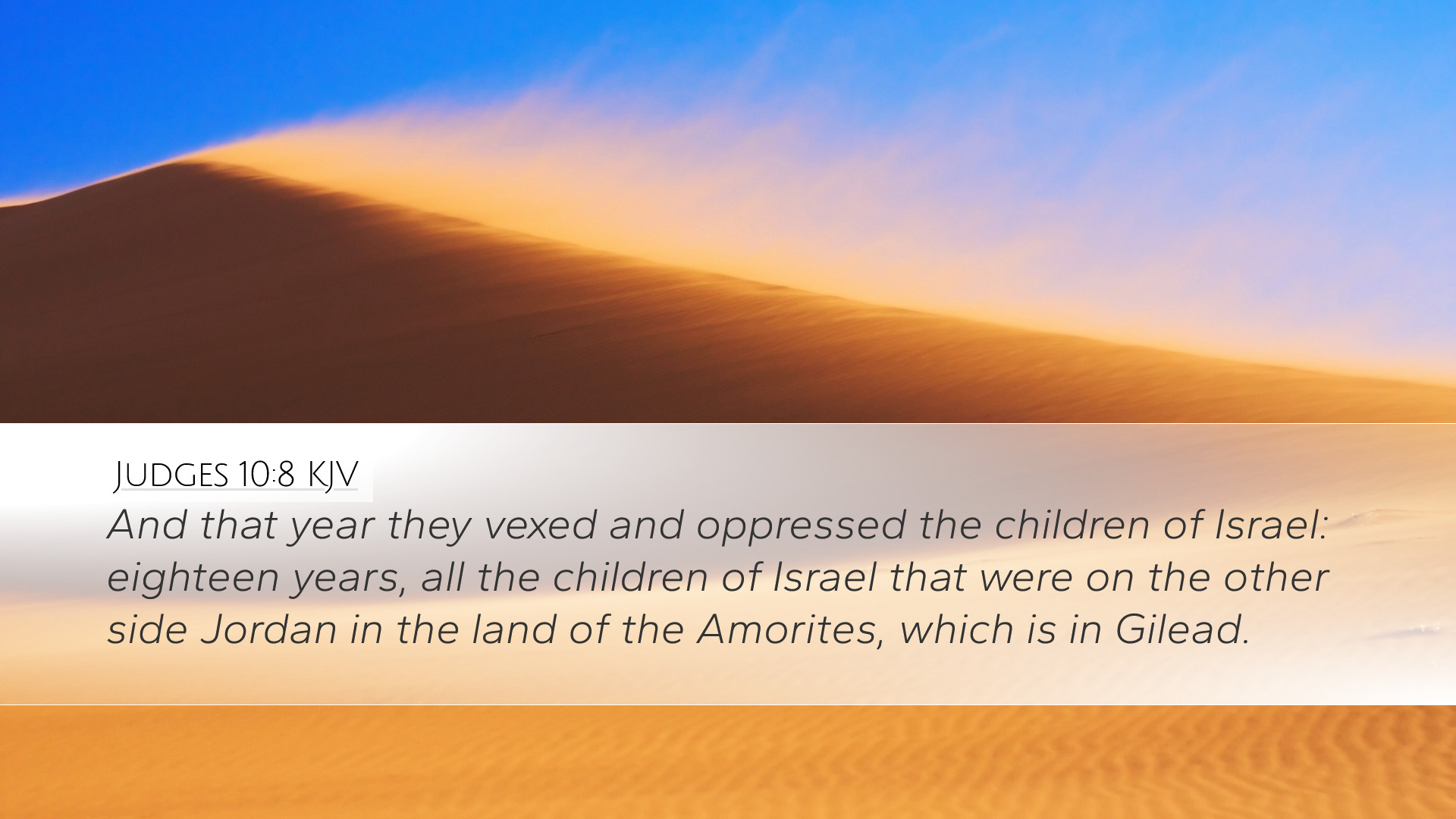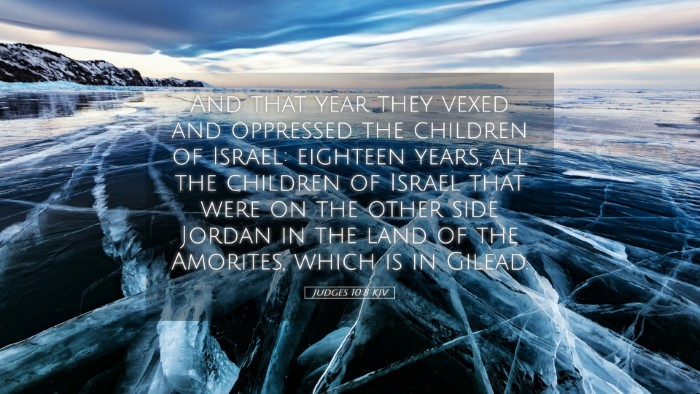Old Testament
Genesis Exodus Leviticus Numbers Deuteronomy Joshua Judges Ruth 1 Samuel 2 Samuel 1 Kings 2 Kings 1 Chronicles 2 Chronicles Ezra Nehemiah Esther Job Psalms Proverbs Ecclesiastes Song of Solomon Isaiah Jeremiah Lamentations Ezekiel Daniel Hosea Joel Amos Obadiah Jonah Micah Nahum Habakkuk Zephaniah Haggai Zechariah MalachiJudges 10:8
Judges 10:8 KJV
And that year they vexed and oppressed the children of Israel: eighteen years, all the children of Israel that were on the other side Jordan in the land of the Amorites, which is in Gilead.
Judges 10:8 Bible Commentary
Commentary on Judges 10:8
Verse: "And that year they vexed and oppressed the children of Israel: eighteen years, all the children of Israel that were on the other side Jordan in the land of the Amorites, which is in Gilead."
Contextual Overview
This verse occurs in a tumultuous period for Israel, characterized by cycles of sin, oppression, repentance, and deliverance. It is important for pastors and theologians to understand the sociopolitical landscape of the time, which involved ongoing conflicts with neighboring nations, particularly the Ammonites.
Historical Background
-
The Cycle of Apostasy:
Judges describes a repetitive cycle where Israel strays from God, faces oppression from adversaries, cries out for deliverance, and is rescued by a judge. This verse encapsulates a later stage in this cycle, highlighting the duration and intensity of the oppression by the Ammonites.
-
Geographical Significance:
The reference to Gilead is critical as it was a region known for its Israelite population and strategic importance in defending against enemies.
Explanation of the Verse
This verse highlights a crucial moment in Israel’s narrative where the oppression lasts a significant period, namely eighteen years. The prolonged nature of this conflict signifies a deeper spiritual aloofness from God, which underscores a prevalent theme in the Book of Judges—Israel's persistent rebellion and subsequent divine judgment.
Theological Insights
-
The Consequences of Apostasy:
Matthew Henry posits that the length of the oppression is a direct consequence of Israel's sins. The suffering endured by Israel is reflective of divine justice and the seriousness with which God treats sin. It serves as a warning about the dangers of turning away from God.
-
God’s Patience and Justice:
Albert Barnes reflects on the patience of God—a key theme in the Old Testament. God allows His people to experience the full weight of their choices, which leads to eventual repentance and return. This verse is a poignant reminder of the balance between divine mercy and justice.
-
Call to Humility:
Adam Clarke draws attention to the humility required when in oppression; the nation of Israel's cries echo the human experience of seeking divine intervention in times of distress. This teaches the essence of prayer and reliance on God’s strength amidst trials.
Application for Today
This verse holds profound implications for modern readers, especially for pastors and church leaders. Here are some considerations for application:
-
Understanding Consequences:
Believers today must recognize that turning away from God's commandments can lead to suffering—not only personally but communally. Churches can draw from this lesson by promoting faithfulness and accountability.
-
Encouragement in Trials:
This verse provides a framework for understanding trials as part of God’s discipline. Church leaders can encourage congregants, reminding them that challenges may serve a greater purpose in shaping their character and faith.
-
Restoration Process:
The eventual deliverance of Israel is critical to any discussion around Judges 10. Offering hope to those in despair, churches can focus on themes of redemption and the assurance that God hears our cries.
Conclusion
Judges 10:8 serves as a historical account, a theological lesson, and a contemporary call for introspection. By studying this verse, pastors, students, and theologians can enrich their understanding of human nature, divine justice, and the grave importance of staying aligned with God's will. Through this narrative, we learned that God remains sovereign even in our darkest moments, and His return to faithfulness always beckons.


